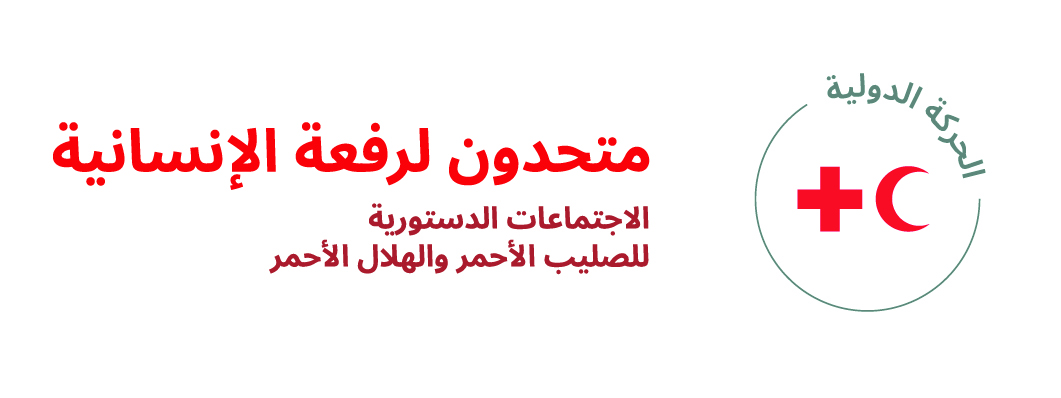أ) أهداف التعهد
Pledge on Sexual and Gender-based Violence in Emergencies – Focus on Situations of Conflict and Disasters
The National Red Cross or Red Crescent Society and/or government in their domestic and international programming pledges to work to end all forms of sexual and gender-based violence in emergencies with a focus on situations of armed conflict, disasters and other emergencies. We pledge that addressing sexual and gender-based violence remains a priority internationally, including for the International Red Cross and Red Crescent Movement and governments.
In humanitarian crises, the collapse of social structures and lawlessness combined with pre-existing gender inequalities increases the risk of exposure to sexual and gender-based violence. Women and girls are predominately affected and particularly susceptible to rape, child, early and forced marriages, infanticide and sexual exploitation. In many armed conflicts, men and boys, particularly adolescent boys, are also the targets of sexual violence. Based on our mandates, we undertake to protect all women, girls, boys and men of all backgrounds through prevention, risk mitigation and response from all forms of sexual and gender-based violence in humanitarian crises.
ب) خطة العمل:
. Based on our mandates, we undertake to protect all women, girls, boys and men of all backgrounds through prevention, risk mitigation and response from all forms of sexual and gender-based violence in humanitarian crises by:
(1) Strengthening Sexual and Gender-Based Violence Programming Responses:
- Coordinating and cooperating with Red Cross and Red Crescent Movement partners, specifically the ICRC, IFRC, National Red Cross and Red Crescent Societies in line with their respective mandate and roles within the Movement, and exchanging experiences and best practices;
- Coordinating with Red Cross and Red Crescent Movement partners as well as relevant international, national and local stakeholders such as appropriate government agencies, civil society, the United Nations, and local non-governmental organizations to identify best practices and effective measures to prevent and respond to such violence;
- Building capacity through training, technical support, and strengthening local expertise and community-based initiatives with support from the ICRC and IFRC.
- Encouraging the active and meaningful participation of all women, girls, boys and men in local emergency preparedness, response and recovery decision-making processes, including strengthening peace processes;
- Encouraging immediate measures to mainstream the prevention, risk mitigation and response to sexual and gender-based violence within armed conflicts, disasters and other humanitarian crises in preparedness, response and recovery; and
- Supporting and promoting the mobilization of adequate resources and services to prevent, mitigate, and respond to sexual and gender-based violence, including strengthening human capacity and techniques.
(2) Strengthening Sexual and Gender-Based Violence Policy and Advocacy:
- Promoting evidence based programming, including the strengthening of sex-, age- and disability- disaggregated data to explicitly identify gaps in sexual and gender-based violence policy and programming;
- Promoting local community efforts to raise awareness on sexual and gender-based violence through implementing primary prevention initiatives that address the underlying social and cultural norms that perpetuate gender bias and discrimination in order to encourage behaviour changes to eliminate power imbalances and to promote and protect human rights and the dignity of women and girls;
- Supporting the supply of comprehensive health care, including access to sexual and reproductive health services and psychosocial and economic assistance to survivors along with the establishment of safe spaces;
- Working to protect humanitarian workers and the people they serve in local communities from sexual and gender-based violence through the development and implementation of internal organizational processes and mechanisms to prevent, report and respond to allegations by adopting a zero tolerance policy on this issue taking into account Movement Codes of Conduct as well as the Inter-Agency Standing Committee Plan of Action and Core Principles of Codes of Conduct on Protection from Sexual Abuse and Exploitation in Humanitarian Crisis and the Minimum Operating Standards on Protection from Sexual Exploitation and Abuse by own Personnel;
- Emphasizing that the principle of “do no harm” should be central to all programming and making reasonable efforts to ensure that any support provided will not be a source of additional conflict/violence or exacerbate pre-existing vulnerabilities. This includes respecting the confidentiality and consent of all survivors of sexual and gender-based violence through a survivor-centered approach;
- Promoting adherence to relevant protection frameworks and minimum standards such as the IFRC Minimum Commitments to Gender and Diversity in Emergency Programming (2015), the Inter-Agency Standing Committee Guidelines for Preventing and Responding to Gender-Based Violence in Emergencies (2015), the IFRC Principles and Rules for Humanitarian Assistance, the SPHERE Minimum Standards for Child Protection in Humanitarian Action and the United Nations Sustainable Development Goals among others;
- Provide support to government agencies and Red Cross and Red Crescent National Societies in their efforts to develop and make mandatory child protection policies to protect girls and boys from all forms of violence;
- Advocating for the prevention, enhanced response mechanisms and appropriate services to eliminate and address sexual and gender-based violence in armed conflict, disasters and other emergencies in relevant humanitarian fora;
- Working to disseminate information on existing legal provisions that prohibit sexual and gender-based violence as widely as possible in military instruction and training;
- Continue to ensure that prohibitions against sexual and gender-based violence, as well as appropriate responses to instances of violations, are fully integrated into doctrine and operation plans, including for partnered military operations; and
- Sharing experiences and good practices where appropriate with other governments, militaries and the International Conference.
ج) مؤشرات قياس التقدم المحرز
As outlined above




